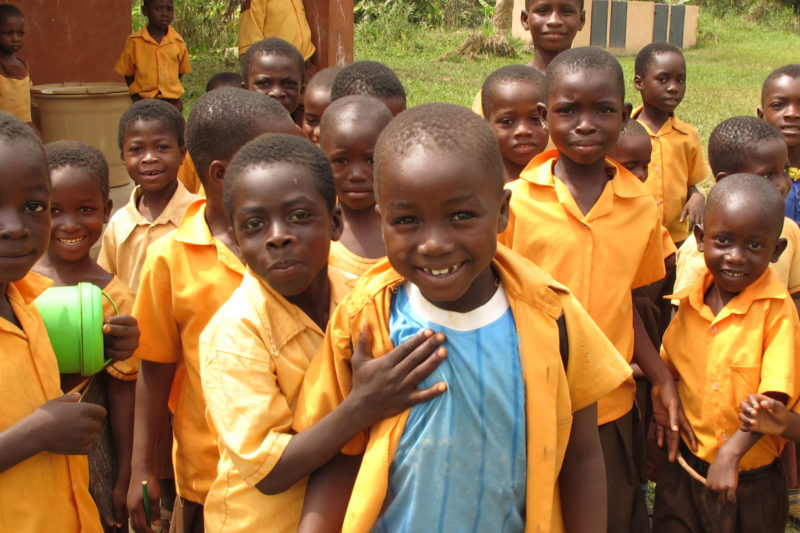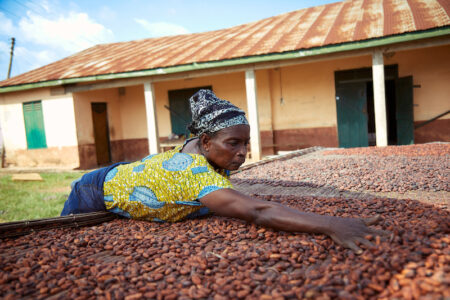The International Cocoa Initiative calls for greater industry-wide action on child and forced labour

The International Cocoa Initiative (ICI) has called for ‘a massive expansion’ of collaboration from the industry’s key players to reach out at risk children and adults who are vulnerable to forced labour within the sector, reports Neill Barston
As the child-protection organisation revealed to Confectionery Production in its lates 2021-26 strategy, its main goal remains increasing children’s and workers’ rights within core producing nations including Ivory Coast and Ghana, which account for two thirds of the supply chain serving the confectionery market.
According to ICI’s research, a total of one in three youngsters in the two key cocoa-growing nations is involved with some form of child labour, with a more limited problem relating to forced labour on a localised level, which the group said remained a notable problem within agricultural systems. Wider industry studies have revealed that around two million children are affected by the overall issue of child labour within the West African nations.
Significantly, the organisation’s findings revealed that only between 10-20% of children in the entire cocoa chain are presently covered by monitoring and remediation measures, which it is aiming to reach a figure of complete coverage through the support of cocoa and confectionery manufacturers through a series of joint actions.
As previously reported, the cocoa sector has put forward a number of initiatives over the past 10 years on this core issue, ranging from groups including Fairtrade, Rainforest Alliance and World Cocoa Foundation, through to company-led initiatives from Mars, Mondelez International, Barry Callebaut, Cargill, Olam and Tony’s Chocolonely.
In response to the situation, ICI, which has been operating in the region for over 13 years, has produced its latest strategy has established a roadmap to achieve its vision of thriving cocoa-growing communities within a dignified, sustainable and responsibly-managed cocoa supply chain, consisting of three key pillars.
These include: delivering responsible supply chains built on systems and services that responsibly and transparently prevent and remediate child labour and forced labour across the entire cocoa supply chain.
Secondly, to create a supportive enabling environment with local, national and international policies and laws, that inspire, motivate and obligate progress, from human rights due diligence legislation in cocoa-consuming countries, to policies that continue to advance access to quality education and social protection in cocoa-producing countries. Finally, ensuring coordinated approaches to support collaboration, alignment and accountability across the cocoa and chocolate industry, civil society, governments, and donors to maximise their collective impact is also considered of vital importance.
Increasing its operations
Together with its industry partners, including civil organisations and government, ICI has, over more than a decade, has made an impact on what remains an ongoing issue. Since 2015, its collective work has reportedly delivered improved child protection for over 380,000 children, as detailed in its annual report.
The organisation’s Child Labour Monitoring and Remediation Systems and community development approaches have been proven to be effective at reducing child labour, with research and learning contributing to the continuous improvement of these efforts.
Through its new Strategy, ICI’s focus will pivot to three core areas: Innovation and learning: ICI will continue to test and evaluate new ways of tackling child and forced labour and will conduct research on root causes, effective policies and promising practices.
Technical advocacy: ICI will promote the knowledge and learning it generates, engaging in the development of policies and standards, supporting all stakeholders to align their actions for a more coordinated approach and mobilising resources to unlock investments required for the scale up of effective solutions.
Capacity and systems strengthening: ICI will provide time-limited operational support to its members and partners to set-up child labour and forced labour prevention and remediation mechanisms that can eventually be sustained without ICI’s support, strengthening national, corporate, civil society and community systems and helping them work together.
ICI expects that these efforts will inspire and deliver the required 100% coverage of human rights due diligence systems that prevent and remediate child labour and forced labour. 25% of the full supply chain will be covered by ICI’s direct work with its partners, while ICI will use its influence to drive collective efforts to cover the remaining 75% of the supply chain. This will positively impact the lives of 1.7 million children by 2025.
“This new strategy is ambitious. We are aiming to drive full coverage of child labour and forced labour risks across the cocoa supply chain in Ghana and Côte d’Ivoire, which involves reaching 70% more children than under our previous strategy,” said Nick Weatherill, ICI’s Executive Director. “While a significant undertaking that will require more actors to engage and all actors to invest more, we believe full coverage is possible building on the results of the past and on the collaborative energy in the sector.
“We can see that momentum is building for real change. Human rights due diligence legislation, for instance, is being increasingly applied to global supply chains, requiring more and more actors to implement the kind of approaches that ICI has developed with its partners. With ICI playing a catalytic role in refining, promoting and embedding these tools, and with all actors in the cocoa sector working together as part of a coordinated multi-stakeholder effort, we can bring our collective vision of thriving cocoa-growing communities to life.”



